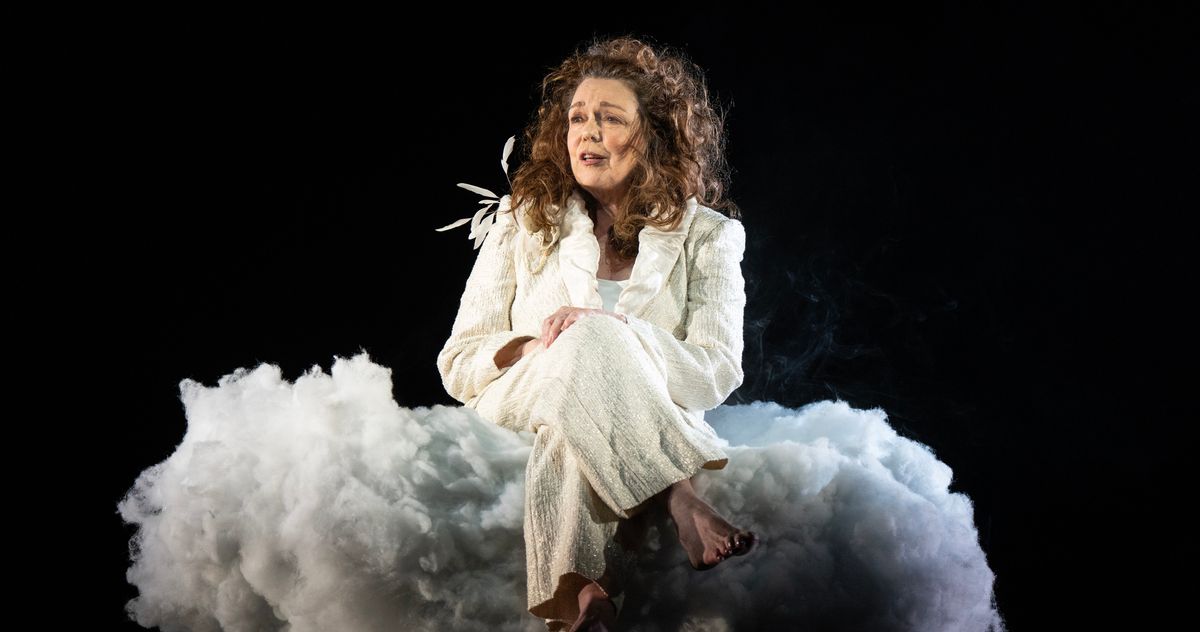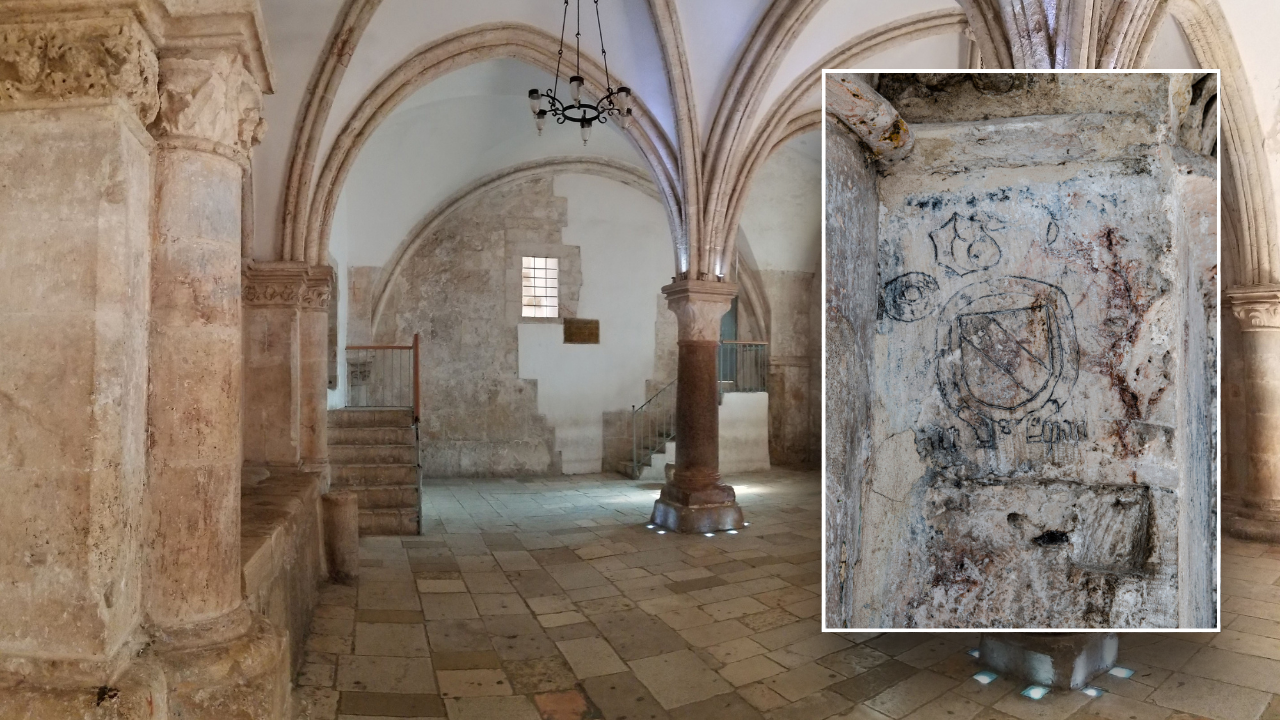Deirdre O’Connell in Caryl Churchill’s Imp.
Photo: Joan Marcus
The English-speaking theater world doesn’t have that many living saints, but Caryl Churchill is unquestionably one of them. Now 86, Churchill has been writing formally audacious plays since the late 1950s, though her career really began to shake and shape the field 20 years later — some of her most-produced work keeps resonating partly because of its intrinsic revolt against Thatcherism, a political ethos that retains such a death grip on our own reality. Like many a canonized mystic, she’s not easy. Her work can be spare and enigmatic or staggeringly dense; it’s often tartly funny and almost always chilling. There’s a haunted quality, a gymnastic facility with language, an intellect like an impact driver. For my own part, I’ve long stood in awe of Churchill on the page, where it feels clear that some kind of masterful spell is being woven, whether or not you can parse all its steps or ingredients. In the theater, my experiences of her work have varied. She’s not a warm writer, and calibrating the amount of alienation her pieces provoke can be a central production challenge — like being presented with an extraordinary new tool and trying to figure out exactly how to put it to its best use.
The director James Macdonald has been working with Churchill’s tools for a long time, and the two artists’ ease with each other gives Glass. Kill. What If If Only. Imp. — a quartet of her recent one-acts, now making its premiere as a combined set at the Public — a sense of aesthetic confidence out of the gate. Miriam Buether has framed the set with a proscenium of marquee bulbs and whisks a red curtain across its gaping blackness between the four pieces. In the first half of the evening, these intervals are also devoted to a pair of virtuosic turns by the circus performers Junru Wang and Maddox Morfit-Tighe. The theater becomes a midway as Wang vaults herself through a dazzling series of balancing feats and Morfit-Tighe, throwing sly glances at the audience, juggles more and more pins with the athletic nonchalance of a carnie Tony Hawk. Remember, it’s all a trick, Churchill and Macdonald seem to be saying. This “difficult” language has more in common with the acrobat than the academic. Resist seriousness; embrace astonishment.
As lessons in spectatorship go, it’s delightful. “You’re beautiful, but I’m also useful,” says a clock (embodied with grand hauteur by Sathya Sridharan) to “a girl made of glass” (Ayana Workman) in the first play of the set. Linguistically, Churchill is interested in both — beauty, especially of the wondrous-strange variety, and utility. How are they linked? Is the latter, when it comes to art, always more of an aspiration than a reality? “I was reading about this man who spent ten years trying to paint an apple so it looked just like an apple … Then he spent seven years trying to paint an apple so it looked nothing like an apple,” muses a man (also Sridharan) at the start of What If If Only. “Then he died.” (No one talks much about it now, but Picasso’s early work showed a total grasp of naturalism; then he moved on to other apples.) Among her ruminations, Churchill plays with the idea of experimentation itself. Haven’t we all seen plenty of normal apples? What might be the wonder, or even — dare we aspire? — the use of seeing the thing refracted, reframed, broken up or juggled with or otherwise distanced from itself?
Although each play stands on its own — Glass least compellingly; it makes for a somewhat Churchill-doing-Churchill beginning — there’s a cumulative braiding of ideas that occurs as each one follows the last. The first three are gemlike — smaller studies in which a writer is turning an existential prism around in her fingers. Imp, which comes after the show’s intermission and takes up its whole second act, is a heavier, craggier slab of rock, with more of the usual things (narrative, character) and just as much mystery and menace pressing up beneath the surface — a subterranean river threatening to burst its earthen crust. Imp brings all the quartet’s chief preoccupations back around: the threat of violence, especially of suicide; questions of fantasy and belief; and the weird eternal recurrence of our own human myths.
Before that, in Glass, we overhear the inner lives of a series of inanimate figures arranged on a mantelpiece: the glass girl, the clock, a vase (Japhet Balaban), and a red plastic dog (Adelind Horan). Though perhaps they’re not objects at all; perhaps it’s a Cubist approach to the apple, an abstracted vocabulary with which to document the girl’s terror and pain. In Kill, the marvelous Deirdre O’Connell hovers suspended inside the blackness of the set’s frame — barefoot and clad in a sparkly, befeathered white suit that looks like it’s seen better days, she perches on a single fluffy cloud that could have drifted straight out of a child’s drawing. (Isabella Byrd’s lights do an immaculate job of carving the show’s floating vignettes out of the void.) O’Connell is a god — or maybe all the gods — and with wry pragmatism, she talks us through a litany of gory human tragedies. What she’s reciting is essentially the plot of Aeschylus’s Oresteia, along with all the backstory horrors of the House of Atreus. As she boomerangs back and forth through the whole bloody timeline, she keeps reminding us with a shrug, “We don’t exist, people make us up.”
Kill’s implications for both the world-shaping power of human fantasy and the futility of escaping our own stories spin forward into What If If Only. There, Sridharan’s nameless man grieves a loved one (also Workman) who’s taken her own life. In a moment of seeming miracle, she appears to him — only it’s not her; it’s a version of the future that has her in it. “Make me possible …” pleads this potential future. “I’m a Future you’d really like … Equality and cake and no bad bits at all and I’ve been glimpsed, I’ve been died for in China and Russia and South America, people wanted me, they want me over and over …” Though Sridharan and Workman are navigating a mostly empty white box, and though Workman is playing an idea, a ghostly, flickering fragment, there’s still an awful, palpable familiarity to the man’s howls of impotence: “How? How do I?” he asks, agonized, as the future begs for existence. “I don’t know what to do, tell me, please.”
Then comes Imp — gorgeously laid out by Macdonald and Buether on a raked rectangle of Persian carpet that seems, like the cloud before it, to float, magical, in the surrounding blackness. Imp’s characters suffer less over potential futures in the grand imaginative sense than they do over the daily minor turbulence of their own lives. Yet still there are ghosts in the machine; death and myth and the potency of belief, even when ill-defined, fill the world with strange flickers and shadows. O’Connell, again terrific, and John Ellison Conlee, also outstanding, anchor the piece as Dot and Jimmy, an eccentric pair of cousins living together on the financial fringes in London. They’ve recently taken a bereaved niece from Ireland, Niamh (Horan, doing lovely, subtly off-kilter work), under the wing. They’ve also developed a friendship with an unhoused man called Rob (Balaban, who gives the character an anodyne charm that borders on sinister in just the right way).
As in her apocalypse play Escaped Alone, Churchill builds up currents of cryptic peril underneath casual banter. Niamh’s eyes go intermittently glassy as malformed fears float up from her subconscious: “I’m frightened I’ll go back to Ireland and become a nun”; “I’m frightened I might turn into something … Like a werewolf.” Jimmy has a habit of lacing his conversation with local gossip that just happens to mirror the plots of famous tragedies: “I saw an old guy this morning when it was raining, used to have his own business and he gave it all over to his daughters … They’re treating him so badly”; “There was that woman killed her children to get back at her husband, it was in the local paper, did you see it?” And Dot — well, Dot keeps an imp in an old wine bottle. “You don’t exactly believe in it,” insists Jimmy in a frenzied moment of confrontation. O’Connell snarls like a wild thing: “It’s not about exact. You stupid fuck.”
Churchill’s politics emerge with the same craftiness as her mysticism, like a beam refracted around the corner of a dream-logic prism. What kind of lives necessitate the possibility of a wicked little fairy in a bottle in order to cling to some feeling of control, some bright, jagged secret in the murk of lost jobs, failing bodies, mental illness, and minuscule benefits checks? What’s to be done if we all find ourselves at an impasse, picturing Utopia — or at least, in the words of What If’s embodied future, something “not perfect but better, better” — and powerless to bring it about? When do we all stop shouting “How? How?” into the wind?
Glass. Kill. What If If Only. Imp. is at the Public Theater through May 11.












